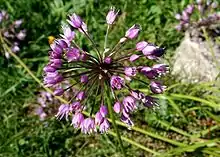Allium lusitanicum
Allium lusitanicum is a plant species widespread over much of Europe, mostly in mountainous regions. It has been reported from every country on the continent from Portugal to Ukraine except Iceland, Ireland, the United Kingdom, Netherlands, Belgium, Luxembourg, Denmark, Finland, Albania and Greece.[3][4]
| Portuguese onion or mountain onion | |
|---|---|
 | |
| Scientific classification | |
| Kingdom: | Plantae |
| Clade: | Tracheophytes |
| Clade: | Angiosperms |
| Clade: | Monocots |
| Order: | Asparagales |
| Family: | Amaryllidaceae |
| Subfamily: | Allioideae |
| Genus: | Allium |
| Species: | A. lusitanicum |
| Binomial name | |
| Allium lusitanicum Lam. | |
| Synonyms[1][2] | |
| |
Allium lusitanicumm is a bulb-forming perennial with thread-like leaves shorter than the stipes. Stipes are up to 20 cm tall. Tepals, anthers and styles are all a uniform shade of rose-violet.[5]
References
- Tropicos
- The Plant List
- Altervista Flora Italiana, Schede di Botanica. Allium lusicanicum
- Friesen, Nikolai. 1998. Taxonon\my, chronology and evolution of Allium lusitanicum, the European Allium senescens. Linzer Biologische Beitraege. Linz. 30:815-830.
- Lamarck, Jean Baptiste Antoine Pierre de Monnet de. 1783. Encyclopédie Méthodique, Botanique 1: 70.
This article is issued from Wikipedia. The text is licensed under Creative Commons - Attribution - Sharealike. Additional terms may apply for the media files.